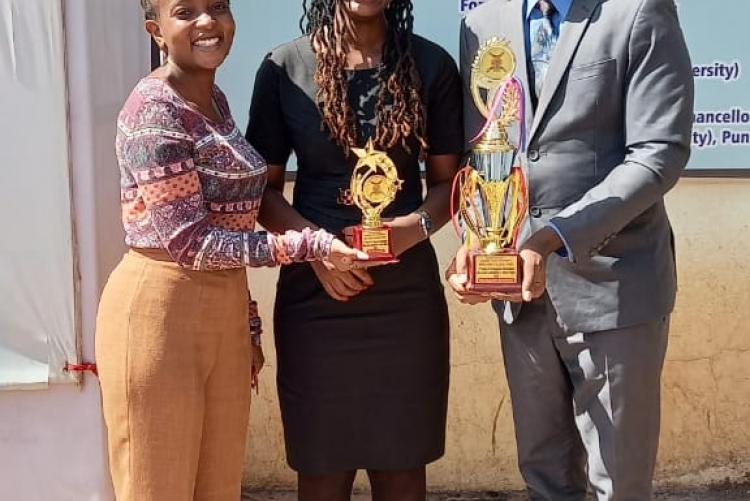The University of Nairobi Faculty of Law Students participated in the 11th Justice PN Bhagwati Moot Court Competition on Human Rights. The competition was held at the Bharati Vidyapeeth University New Law College in Pune, Maharashtra, India on 24-26 March 2023. The University was represented by a team from the Faculty of Law, Parklands Campus comprising three final year students, namely Victor Kihika, Mercy Cheptoo and Patience Mwangi. The team had a partial scholarship from the organizers, catering for all expenses save for the return air ticket and visa, which the faculty of law catered for.
The moot competition attracted 20 local and international teams who participated in a two day competition. The Chief Guests of the Competition were two Justices of the Supreme Court of India, namely Honourable Mr Justice C.T. Ravikumar and Honourable Ms Justice Hima Kohli . Just a week before, a delegation of the Supreme Court of Kenya led by the Chief Justice, Honourable Martha Koome, visited the Supreme Court of India on official duty.
The finals of the competition were judged by four judges of the High Courts (the highest state courts) of four different Indian States namely Kerala, Delhi, Maharashtra and Allahabad. The said justices are among the leading judges in the area of Human Rights, continuing the legacy of former Indian Chief Justice who is acclaimed for championing Human Rights through numerous precedent setting court decisions, Honourable Justice PN Bhagwati, in whose memory the moot is named.
The team recorded an excellent performance, with one of the team members, Victor Kihika winning the award of best male speaker (international) for having the best individual score. The team argued a case concerning international human rights law. Specifically, alleged human rights violations committed by two states in the course of armed conflict over the ownership of a territory which was formerly independent but which acceded to one of them to the disappointment of the other.
The team reported to have enjoyed the competition in terms of hospitality, the organization, the level of preparation and support of the organizers. Additionally, the team were very inspired by the guests and judges of the competition who are the pride of India, having served in numerous capacities and been trailblazers in human rights protection. While there, the team visited various historic sites in the City of Pune such as Shaniwar Wada Palace and Aga Khan Palace and famous shopping places such as Indian open markets and Phoenix Mall, the largest in the City.
Overall, the team intimated that it had learnt alot from the competition in relation to the area of law (human rights) which they would carry with them forever and consider a career in human rights protection. This was in addition to other tips relating to organizing moot competitions which they would consider implementing back in Kenya. One key benchmarking point was elimination of bias in moots. As a rule of thumb, host institutions of any competition are precluded from participating by presenting a team. This not only eliminates the perception of bias and enhances the objectivity of the organizers and in turn the legitimacy of the results, but also enables them to focus on all aspects of preparation and the intended impact of the competition. This comes at a time when moot competitions in the country have been accused of bias and was thus taken to be a pragmatic way of dealing with such concerns, to achieve fair and competitive engagements.
On behalf of the team, Mr Victor Kihika thanked the Faculty of Law and the University for the immense support in the competition and recommended that they continue supporting teams to participate in the competition on an annual basis for exposure at that level, especially now that moot court is a core course in the law curriculum.

